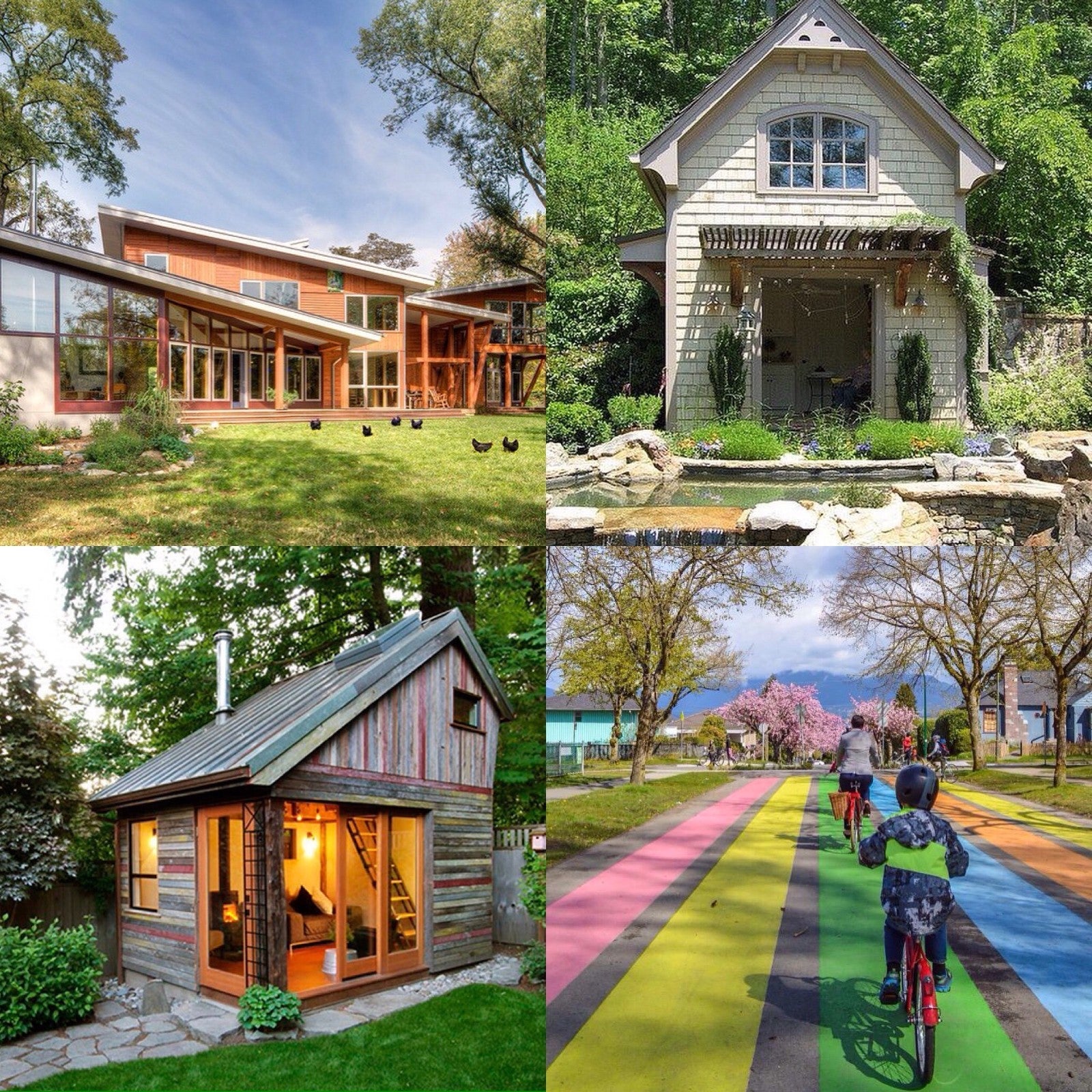Metro Vancouver I North Shore I Fraser Valley Home Affordability 2018
(January 25, 2018
)
 It’s that time of year again – the time when Vancouver's real estate mental health issues shine louder than ever.
It’s that time of year again – the time when Vancouver's real estate mental health issues shine louder than ever. Yes folks it's time for left leaning Demographia to trot out its annual virtue signalling affordability report, again announcing Vancouver is in the top three least-affordable real estate markets in the world (like we didn't know that already?). The only reason BCHH is addressing it is that the usual suspects, main stream media, far left NGO's with their collective hands out, every radical alt left politician and dipper love to use it as another battering ram in an effort to attack tax payers, homeowners and businesses. In an effort to acquire and sprinkle your hard earned taxes and other money like its ferry dust on urban voting centres. So here is the BCHH truth about real estate read, enjoy the boring but nonetheless, we think, important ride.
The study compares local incomes with local home prices, and by that measure our city does very badly indeed – third only to Hong Kong and Sydney in the unaffordability rankings. However, in real life, this is a highly inaccurate measure of housing affordability.
In your monthly expenses, what actually matters to you in terms of affordability? The total price of your home? Or the payments you have to make on your mortgage, coming out of your heavily taxed paycheck? The latter, right?
The income-to-home-price measure doesn’t work because the vast majority of people – even first-time buyers, and especially those further up the property ladder – do not buy a home with only their income. They put down a down payment and then pay off their mortgage with their income. And by the way, the average new mortgage in Metro Vancouver in 2016 (the most recent data, released August 2017) was $438,716 – in a year when the average home sale price was $1.02 million.
The income-to-home-price measure doesn’t work because the vast majority of people – even first-time buyers, and especially those further up the property ladder – do not buy a home with only their income. They put down a down payment and then pay off their mortgage with their income. And by the way, the average new mortgage in Metro Vancouver in 2016 (the most recent data, released August 2017) was $438,716 – in a year when the average home sale price was $1.02 million.
This price-to-mortgage gap is largely because around 70 per cent of all real-estate purchases are made by non-first-time buyers. That is, people who are selling a home to buy the next one, and therefore already have equity to offset against the cost of their new mortgage. The higher real estate prices have risen, the more equity they have to set against the new home price – which means their new mortgage doesn’t rise according to prices.
Add into that money flowing into locals’ pockets from things like inheritance (often from the high-priced sales of local homes) and generational wealth transfer from Baby Boomers freeing up millions in equity, and you often get situations where Metro Vancouver, North Shore, Fraser Valley (and across British Columbia) locals are able to afford homes because of the high prices, not despite them. (Lazy millennials that know nothing of the 20 percent mortgage rates and recession of the late 1970's and 1980's tapping into the Bank of Mom and Dad are a classic example of this.) And around 50 per cent of hard working, tax paying Metro Vancouver homeowners have no mortgage at all, and they are sitting on billions upon billions in equity. This unaffordable real estate market has made many local people very wealthy - AS IT SHOULD! Don't let the guilt tripping new age socialists tell you otherwise.
afford homes because of the high prices, not despite them. (Lazy millennials that know nothing of the 20 percent mortgage rates and recession of the late 1970's and 1980's tapping into the Bank of Mom and Dad are a classic example of this.) And around 50 per cent of hard working, tax paying Metro Vancouver homeowners have no mortgage at all, and they are sitting on billions upon billions in equity. This unaffordable real estate market has made many local people very wealthy - AS IT SHOULD! Don't let the guilt tripping new age socialists tell you otherwise.
Add into that money flowing into locals’ pockets from things like inheritance (often from the high-priced sales of local homes) and generational wealth transfer from Baby Boomers freeing up millions in equity, and you often get situations where Metro Vancouver, North Shore, Fraser Valley (and across British Columbia) locals are able to
 afford homes because of the high prices, not despite them. (Lazy millennials that know nothing of the 20 percent mortgage rates and recession of the late 1970's and 1980's tapping into the Bank of Mom and Dad are a classic example of this.) And around 50 per cent of hard working, tax paying Metro Vancouver homeowners have no mortgage at all, and they are sitting on billions upon billions in equity. This unaffordable real estate market has made many local people very wealthy - AS IT SHOULD! Don't let the guilt tripping new age socialists tell you otherwise.
afford homes because of the high prices, not despite them. (Lazy millennials that know nothing of the 20 percent mortgage rates and recession of the late 1970's and 1980's tapping into the Bank of Mom and Dad are a classic example of this.) And around 50 per cent of hard working, tax paying Metro Vancouver homeowners have no mortgage at all, and they are sitting on billions upon billions in equity. This unaffordable real estate market has made many local people very wealthy - AS IT SHOULD! Don't let the guilt tripping new age socialists tell you otherwise.Some buyers – again, the very wealthy around the world, of which Greater Vancouver has many – don’t use their incomes at all to buy a home. They simply pay with cash (as they do everywhere on planet earth) and don’t have any mortgage to pay off. These people might not even have an income – or a local income anyways – but their home purchase still contributes to the house price statistics. By measures such as Demographia’s, their income-to-home-price ratio is dire, and yet it’s not a problem for them to afford that home - never seeming to consider the issue of increasing their income by making more responsible choices. No, it's all your fault tax payer and you should outright pay for or subsidize their problems with your dollars.
Also remember, that the median home price in this measure includes any and all high-end homes that might be bought by people with overseas incomes. And yet the median income being used to compare is local incomes only. So it’s apples and oranges.
And you don’t even have to be rich to be enjoying affordability. What about the retired person on a tiny CPP income, who has lived in a West Side house for 40 years and paid off the mortgage years ago? They, too, contribute to our city’s high prices by selling up for millions and buying another home with the proceeds (again, often all cash). Their income is negligible but they can well afford a pricey home.
The BCHH metric:
So how would you get an accurate measure of affordability? Well, it’s tricky, but a key improvement would be to use the median or average new mortgage being taken out on Metro Vancouver homes (as opposed to home
 price), and compare that figure with median incomes.
price), and compare that figure with median incomes.The average $462K mortgage mentioned earlier is still steep for a family on a median $73K local income, as the repayments would be about 36 per cent of income, and what is deemed “affordable” theoretically stops at 32 per cent. But it’s clear using average mortgages puts a very different perspective on what locals are able to “afford” than Demographia’s measure.
OK, so let's say we at BCHH agree a lot of locals are able to afford homes despite the high prices, for all the above reasons. We know it's true because, well, we sell a heck of a lot of real estate. But Demographia uses the same measure for all cities in the study, and we’re the third worst in the world, so that’s still pretty bad, right?
Well, the study is also highly inaccurate in terms of global city-by-city comparisons, for two reasons.
Apples and oranges
Apples and oranges
First, Demographia doesn’t take into account massive differentials between cities. What about home prices per square foot, for example? Vancouverites enjoy much larger homes, on average, for the prices that we pay, compared with other cities on the list that are deemed more “affordable.” Vancouver’s median condo price per square foot is a steep CAD$998 – but in central London it’s CAD$2,732 and in Manhattan it’s $2,297, according to MLA Canada’s latest research. Yes, those two cities also have higher median incomes, both in the $90Ks as opposed to our $73K, but that no way offsets that price-per-square-foot difference. If you still think Vancouver is less “affordable” than those cities, try buying a 300-square-foot condo.
What about interest rates? In Canada, rates are still very low, whereas in other countries studied they may be much higher, and therefore mortgage payments more onerous, but Demographia doesn’t factor these in. And what about other housing-related costs, such as transport and proximity to the city’s core? Economists widely agree that transport costs should be factored into all affordability studies, and homes in Metro Vancouver on average are much closer to the city’s core than other major global cities, especially our high-priced homes. 

Again, not factored in.
The second major problem here is that Demographia only studies the affordability of cities in nine countries. Nine, out of the 180-plus countries in the world. Paris, for example, is an incredibly pricey city for real estate, averaging around $1,500psf for a condo – and is not included in the study. So it's not exactly exhaustive.
Now, please don’t get me wrong. Of course Vancouver is a very expensive city for real estate (note “expensive,” which is not the same as “unaffordable”). And for all those many people not fortunate enough to afford homes here, as they don't have equity, inheritance or a Bank of Mom and Dad to fall back on, this fact totally sucks – and there are lots of things that should be done about it.
But that is a tale for another day. Phew did you make it to the end? Did you laugh, cry or throw up? Well, if you've made it this far you may be in need of a strong cup of coffee or perhaps even a stiff drink. We can help with the first one so if your considering the sale of your precious home or by chance are buying one don't hesitate to contact our passionate group of real estate nerds anytime for that cup of coffee and a chat, 604-767-6736.
Categories

Archives
- May 2022 (1)
- November 2021 (2)
- October 2021 (3)
- July 2021 (1)
- March 2021 (1)
- April 2020 (1)
- January 2020 (1)
- October 2019 (1)
- September 2019 (1)
- August 2019 (1)
- June 2019 (1)
- April 2019 (1)
- December 2018 (1)
- August 2018 (1)
- July 2018 (1)
- June 2018 (1)
- April 2018 (1)
- March 2018 (1)
- February 2018 (2)
- January 2018 (2)
- December 2017 (1)
- November 2017 (2)
- October 2017 (2)
- August 2017 (3)
- June 2017 (3)
- April 2017 (3)
- March 2017 (3)
- February 2017 (1)
- January 2017 (3)
- December 2016 (4)
- November 2016 (2)
- October 2016 (3)
- August 2016 (3)
- July 2016 (1)
- June 2016 (3)
- April 2016 (3)
- March 2016 (3)
- February 2016 (10)
- January 2016 (5)
- December 2015 (1)
- November 2015 (4)
- October 2015 (3)
- September 2015 (1)
- August 2015 (3)
- July 2015 (3)
- June 2015 (10)
- May 2015 (4)
- April 2015 (9)
- March 2015 (3)
- February 2015 (5)
- January 2015 (12)
- December 2014 (7)
- November 2014 (13)
- October 2014 (13)
- September 2014 (9)
- August 2014 (4)
- July 2014 (10)
- June 2014 (12)
- May 2014 (10)
- April 2014 (5)
- March 2014 (23)


 Subscribe To This Blog
Subscribe To This Blog © 2004. An independently owned and operated broker member of Sutton West Coast Realty. Each office independently owned and operated.
Sutton and Sutton West Coast are service marks of Sutton West Coast Realty and are used herein under license. Mandeep Sendher is the licensed realtor at The BC Home Hunter Group and though he is not the owner of any BCHH domains, trademarks, branding or content he assumes 100% responsibility for any and all online and offline print material, artwork, reports etc. MANDEEP SENDHER is responsible for all problems and issues including this web site or other BCHH social media platforms or electronic communication.
All photos, artwork and materials are assumed to be in the public domain unless otherwise stated. Copyright claims will be honored upon specific identification of material and immediately dealt with upon request.
The content of this website is protected by copyright law. All rights reserved. Unauthorized use in any way, shape or form is prohibited. Information is deemed reliable but is not guaranteed. Maximum care has been put into the accuracy of the content, but specifications and details should be verified by the parties involved in transactions, and we are not liable for any losses whatsoever incurred as a result of information on this website.
You are not permitted to post on or transmit to or from this web site any unlawful, threatening, libellous, defamatory, obscene, inflammatory, pornographic or profane material, or other content that could give rise to civil or criminal liability under the law.
This web site does not grant you any rights to use our trademarks, service marks, logos, artwork or trade names. The content on this site is protected by copyrights, trademarks and service marks, other intellectual property laws, and other laws and regulations.
The design, layout, graphics, photography are copyrighted and the property of THE BC HOME HUNTER GROUP, and may not be reproduced and/or used for any purposes whatsoever, without written consent. THE BC HOME HUNTER GROUP does not claim to own the rights to any or all artwork, designs, photographs etc, found on this web site or any other or any social media unless otherwise stipulated.
BCHOMEHUNTER.COM
VANCOUVERHOMEHUNTER.COM
FRASERVALLEYHOMEHUNTER.COM
NORTHVANCOUVERHOMEHUNTER.COM
WHITEROCKHOMEHUNTER.COM
LANGLEYHOMEHUNTER.COM
CLOVERDALEHOMEHUNTER.COM
WESTVANCOUVERHOMEHUNTER.COM
PITTMEADOWSHOMEHUNTER.COM
BURNABYHOMEHUNTER.COM
COQUITLAMHOMEHUNTER.COM
DELTAHOMEHUNTER.COM
MAPLERIDGEHOMEHUNTER.COM
PORTMOODYHOMEHUNTER.COM
SURREYHOMEHUNTER.COM
SOUTHSURREYHOMEHUNTER.COM
FORTLANGLEYHOMEHUNTER.COM
MORGANHEIGHTSHOMEHUNTER.COM
604LIFE.COM
© 2004. An independently owned and operated broker member of Sutton West Coast Realty. Each office independently owned and operated.
Sutton and Sutton West Coast are service marks of Sutton West Coast Realty and are used herein under license. Mandeep Sendher is the licensed realtor at The BC Home Hunter Group and though he is not the owner of any BCHH domains, trademarks, branding or content he assumes 100% responsibility for any and all online and offline print material, artwork, reports etc. MANDEEP SENDHER is responsible for all problems and issues including this web site or other BCHH social media platforms or electronic communication.
All photos, artwork and materials are assumed to be in the public domain unless otherwise stated. Copyright claims will be honored upon specific identification of material and immediately dealt with upon request.
The content of this website is protected by copyright law. All rights reserved. Unauthorized use in any way, shape or form is prohibited. Information is deemed reliable but is not guaranteed. Maximum care has been put into the accuracy of the content, but specifications and details should be verified by the parties involved in transactions, and we are not liable for any losses whatsoever incurred as a result of information on this website.
You are not permitted to post on or transmit to or from this web site any unlawful, threatening, libellous, defamatory, obscene, inflammatory, pornographic or profane material, or other content that could give rise to civil or criminal liability under the law.
This web site does not grant you any rights to use our trademarks, service marks, logos, artwork or trade names. The content on this site is protected by copyrights, trademarks and service marks, other intellectual property laws, and other laws and regulations.
The design, layout, graphics, photography are copyrighted and the property of THE BC HOME HUNTER GROUP, and may not be reproduced and/or used for any purposes whatsoever, without written consent. THE BC HOME HUNTER GROUP does not claim to own the rights to any or all artwork, designs, photographs etc, found on this web site or any other or any social media unless otherwise stipulated.
BCHOMEHUNTER.COM
VANCOUVERHOMEHUNTER.COM
FRASERVALLEYHOMEHUNTER.COM
NORTHVANCOUVERHOMEHUNTER.COM
WHITEROCKHOMEHUNTER.COM
LANGLEYHOMEHUNTER.COM
CLOVERDALEHOMEHUNTER.COM
WESTVANCOUVERHOMEHUNTER.COM
PITTMEADOWSHOMEHUNTER.COM
BURNABYHOMEHUNTER.COM
COQUITLAMHOMEHUNTER.COM
DELTAHOMEHUNTER.COM
MAPLERIDGEHOMEHUNTER.COM
PORTMOODYHOMEHUNTER.COM
SURREYHOMEHUNTER.COM
SOUTHSURREYHOMEHUNTER.COM
FORTLANGLEYHOMEHUNTER.COM
MORGANHEIGHTSHOMEHUNTER.COM
604LIFE.COM